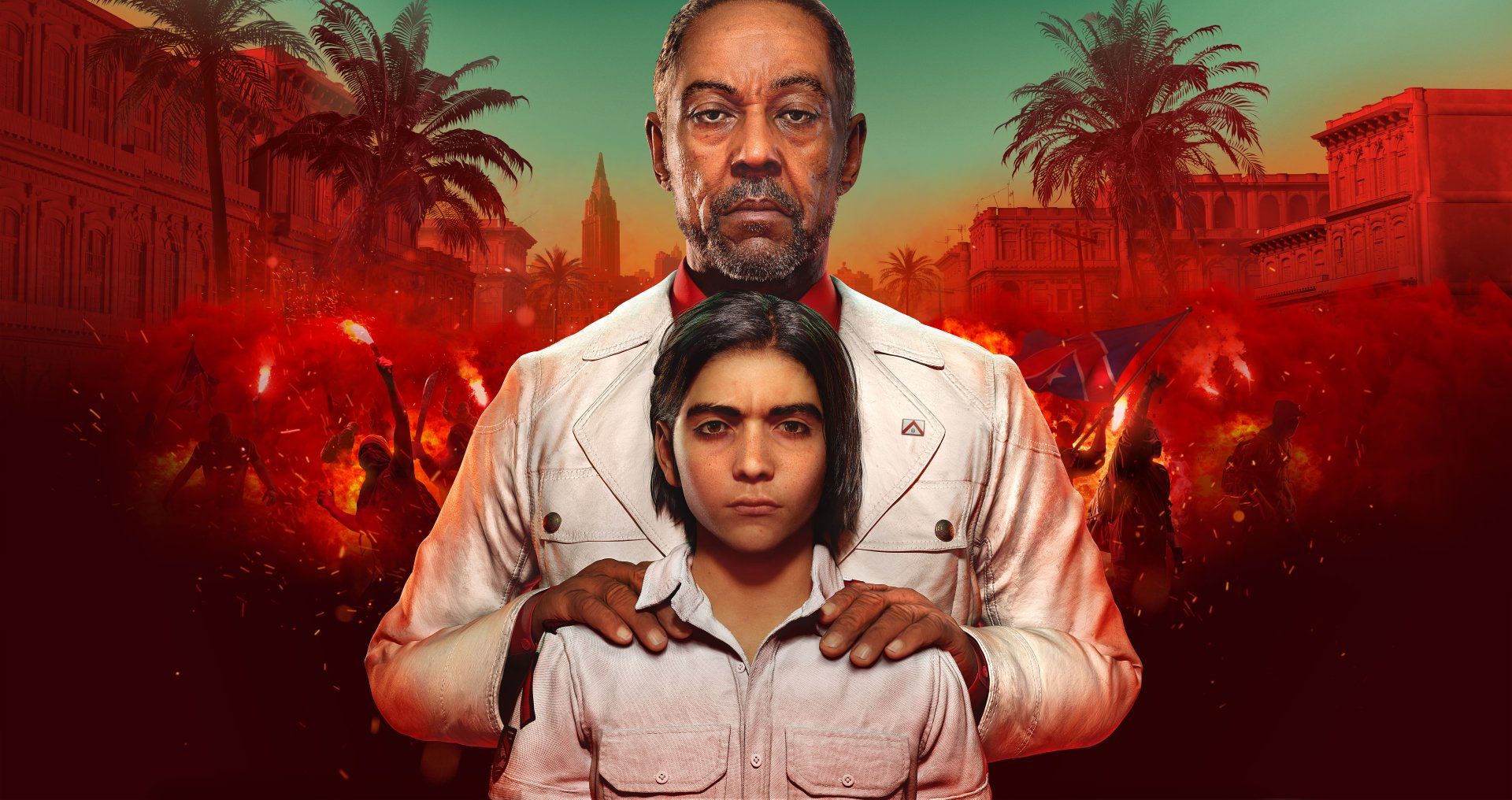“You’re going to have moments with Anton and Diego where the player isn’t present. You’re going to get a window into how he really is, how he really behaves, and how he sees the world,” Far Cry 6 narrative director Navid Khavari tells me about Anton Castillo, the latest larger than life villain to headline the popular shooter franchise. Portrayed by Giancarlo Esposito of The Mandalorian and Breaking Bad fame, Anton is the series’ biggest star to date, and brings with him a number of lofty expectations.
Khavari was anxious about working with Esposito at first, but upon their first meeting in New York, it was clear that the actor was more than ready to take on the role. “I always tried to have an actor’s voice in my head when working on scripts, and I kept hearing his voice,” Khavari explains. “When we finally met in New York, it turned into this epic meeting where he had done notes on the scripts and had his own thoughts and perspectives on how do we make Anton a believeble father – first and foremost. I think this was something he really cheered on and got excited about. Yes, he has this complicated relationship with his son, so it was a really wonderful collaboration and journey together.”
At first glance, Castillo appears to channel the same menacing moral ambiguity that makes the likes of Gustavo Fring and Moff Gideon so reprehensible yet beloved, and it seems that Far Cry 6’s big bad will follow the same trajectory. However, Khavari wants him to be more than a blood-soaked villain, he’s a character with layers and motivations influenced by the trauma inflicted upon him. We can expect the wider narrative to explore that, and how Castillo aims to make the Cuba-inspired nation of Yara into a fascist state that perfectly fits his vision.
“I think we really wanted Anton to have a motivation, a mindset that felt realistic so that you can almost trace back, all the way to the ‘60s and ‘70s and the previous revolution,” Khavari says. “If you go back, this was a kid, when Anton was a teenager he watched his father be executed. In his mind, not only does he see and is informed by an idea of what is rightfully his has been snatched away from him, but he’s internalised this trauma, this violence that informs his perspective. So when it comes to rebuilding paradise, in his words, restoring the land back to how his father saw things. I think violence, and this institution of forced labour is to him a means to an end. It makes sense, and was something we really wanted to hone in on and expose Dani to. A revolution is complex, and the people you’re going to engage with are also complex. I use this line of philosophy, which is that every character has their own heartbeat, you just have to find it. We say villain, but Anton is a character, he’s a person, you need to get to know them.”
I was also curious as to why Giancarlo Esposito, a Black Italian, was cast in the place of an actor more suited to the Cuban origins that Far Cry 6 is evidently drawing from. To Khavari, this was overlooked because it’s all about “the performance he brings to the table and his own personal experiences.” Even after casting Esposito as Cuban, I’m told the cast is incredibly diverse, and Ubisoft claims it tried to ensure it was respecting the culture of Cuba and its people – despite Yara being fictional – everywhere it could. “I think authenticity and representation is extremely important, even beyond the cast, we made sure to have a vocal coach, experts on set, and throughout production we used consultants. So there’s something I really wanted to avoid, which was just having one consultant. We had multiple, so we’d have different perspectives to make sure we were honoring the culture, so I’m hoping the gamers feel that.”
Despite its narrative plans to tackle serious issues such as slavery, fascism, and martial law amidst a nation on the brink of revolution, Far Cry 6 remains a very tongue-in-cheek outing. You can recruit wheelchair dogs and crocodiles to help you fight battles, while weapons range from chaotic flamethrowers to remixed CD launchers. It’s an abrasive mixture of tonal elements, and asked Navari how Ubisoft plans to balance this with Castillo’s unfolding character arc. “We have these wild and crazy moments and contrast that with deep and meaningful storytelling,” Khavari explains. “For me, approaching this, it is kind of the beauty of the guerilla fantasy.Some of them are doing it because they lost family members, some of them are doing it because they see themselves as patriots and are doing it for the flag. Some are just doing it to escape their families and shoot some guns. We have this melting pot of motivational complexity where we tried to translate that into the gameplay and the story.”
So we know about the wider guerilla conflict, but what about Castillo? Khavari ensures me that a number of surprises await in the full release, and Giancarlo Esposito’s character is more than a generic figurehead designed to spout evil and nothing more. “When I sit down to imagine [a new villain] I feel like the secret sauce is to imagine yourself at their kitchen table and just having a conversation with them,” Khavari says, breaking down the design process behind this new villain. “No cameras are around, no performative elements, and just to learn why are you doing the things you’re doing as a dictator? Why would you do this?” If we’re lucky, the reasoning behind Anton Castillo’s motivations are something more, a welcome evolution over the likes of Vaas Montenegro and Pagan Min.
Source: Read Full Article
